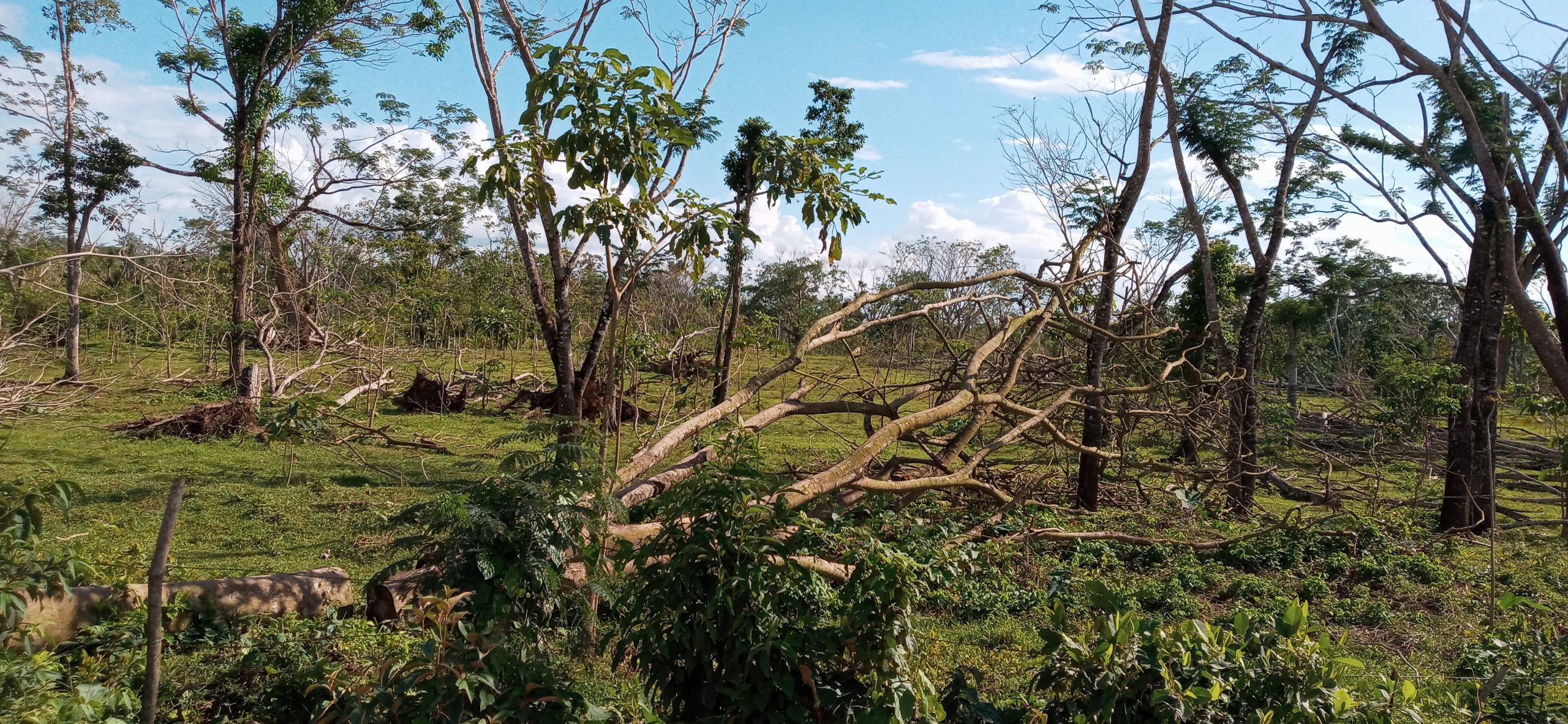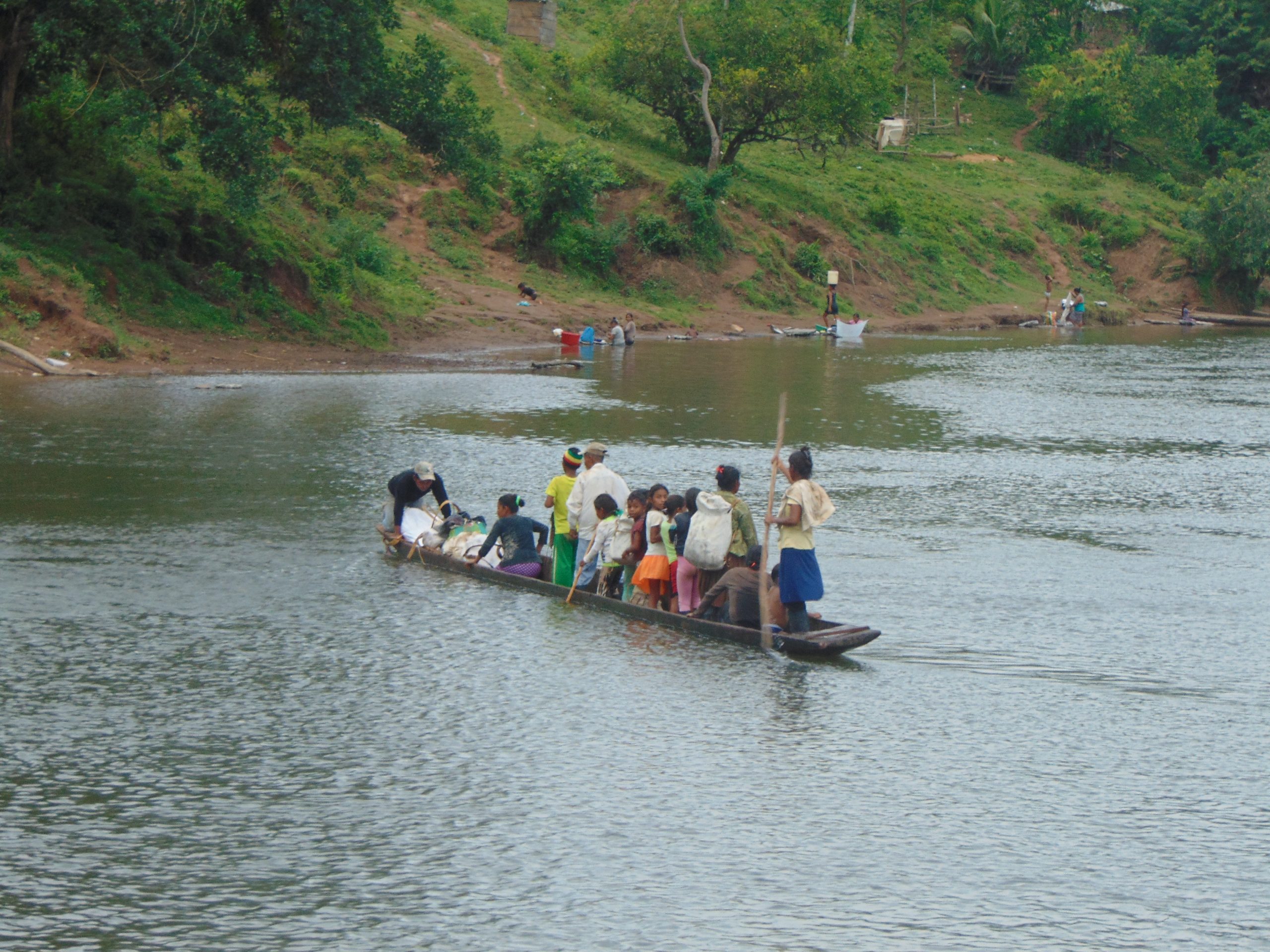By Colectivo Mariposas -Jennifer J. Casolo, Selmira Flores Cruz and Noémi Gonda-, and Andrea J. Nightingale.
In the midst of growing hunger from colonial academia we reflect on the need to right our relationships with the Indigenous and other racialized peoples with whom we work in Nicaragua.
Stories that tell stories
“I cannot sign anything that would permit extractive research”, a Nicaraguan Miskitu scholar- activist told us in response to our request for consent to use the information he shared and demanded a commitment to right relations. “I have given you not just my words, my analysis, my history and my experience, but that of the Miskitu communities I walk with. What do you offer us in return?” He needed a guarantee that we were not “extracting knowledge like others extracting timber and land from Miskitu communities.”

Forest restoration in an Indigenous territory in Nicaragua. Source: JUSTCLIME Nicaraguan research team.
After he spoke, seconds passed, seconds that felt like forever. We replied in our own way about our individual and institutional practices, highlighting our broader commitments to co-research, resource sharing, and non-extraction with other Indigenous and marginalised communities. We closed proposing a second meeting to discuss what the project itself and the Nicaraguan-based institution could offer in return.
His words called for a reckoning with past wrongs, as well as future accountability. Were we attempting to distance “ourselves” from “those who extract” by trying to justify our research and publishing choices? Given our long-standing commitments to social justice processes linked to women’s and peasant movements in Central America, were we glossing over the ways in which each of us had subordinated critical race and decolonial concerns to questions of gender and/or class? We had not a priori selected Indigenous territories as research sites. Rather, our focus on socionatural conflict and climate change led us to draw upon pre-existing relationships with Miskitu, Mayangna and Rama-Kriol professionals and activists. The question our respondent posed forced us to consider the implications of these choices in a new way.
Despite our individual efforts to do non-extractive research, until that moment we had not taken a collective position on how to decolonize ourselves and our research praxis. To keep our promise, we first needed to collectively name, unravel and address the tensions and entanglements that gesturing towards a decolonial – non extractive research praxis means.
Tensions and entanglements with the extraction-assimilation system
Re/produced through mutually constitutive capitalist, colonial and patriarchal relations, the extraction-assimilation system wrecks relationships with and reaps resources from Indigenous and racialized peoples. As Leanne Betasamosake Simpson (Mississauga Nishnaabeg) explains, “colonialism and capitalism are based on extracting and assimilating […] when people extract things, they’re taking and they’re running and they’re using it for just their own good.” Extractive research takes whatever teachings that are useful to knowledge holders out of their context, out of their language, thus “integrat[ing] them into this assimilatory mindset”. The act of extraction absolves those who take what is not theirs of responsibility and “removes all of the relationships that give whatever is being extracted meaning”.
In order to avoid “taking and running”, three tensions embedded in overlapping hierarchies of power and difference came into relief: (i) between the funding-based demands for written production linked to the colonial and extractive underpinnings of the academia on the one hand, and Indigenous territorial priorities on the other; (ii) between the Nicaraguan development institution we were collaborating with, and our personal commitments to gesturing towards decolonial practice; and (iii) between our desire to decolonize ourselves as researchers and our entanglement with Westernized research institutions that require claiming ownership over the production of knowledge. Layers of precarity intertwine making extraction-assimilation the default system in research: the precarities we as emerging researchers navigate, those of the underfunded and under political threat Nicaraguan institution, of our research efforts in pandemic times, and most importantly the precarities (read violence) faced by those in the Indigenous territories themselves.
Gesturing towards deep reciprocity: Negotiations, agreements, accountability
The Miskitu scholar’s demand forced us to face the contradictions of being part of the academic extraction-assimilation system and our desires to choose an alternative path. That alternative, while plural, emerges from what Simpson calls “deep reciprocity. It’s respect, it’s relationship, it’s responsibility, and it’s local”.
To begin, we negotiated budget lines for co-producing processes and products that were priorities for the Indigenous communities. Rather than encountering opposition from project leadership, negotiation and adjustment became opportunities for deepening internal discussions both within the Nicaraguan institute and among the research team about decolonial practice. Resources destined for multi-actor policy encounters and individual field work shifted to strengthening local Indigenous processes to address socionatural conflict.
Second, we co-crafted an agreement with the interviewee´s Indigenous organization laying out a path towards co-research on topics relevant for their communities. The agreement had ambitious objectives: i) a shift in the relationship through resource sharing – intellectual, financial and possibly organizational – to strengthen a process of data collection on unauthorized settlements and related violence in Indigenous communities; ii) collaboration on a research instrument to document violence in Indigenous territories; iii) support to strengthen the capacities of Indigenous youth as researchers, asking questions that matter to the community, documenting ancestral knowledge and analyzing historical and present-day struggles.
Third, in response to the request of Mayangna leaders we began supporting processes where forest guardians from different communities could reflect upon ongoing invasions and increasing violence. The latter resulted in the co-creation of bulletins on land and Human Rights violations in Indigenous territories, locally produced research instruments and the training of Indigenous forest guardians in the use of smart phones for communicating violations.

Workshop with Mayangna forest guardians on the co-creation of bulletins on land and Human Right violations. Source: JUSTCLIME Nicaraguan research team
Reciprocity is rooted in flexibility and friendship. Our starting points for co-creation change as needs, demands, and possibilities shift. Māori scholar Linda Tuhiwai Smith (2016, 137) reminds us that consent is bound by trust, “and [by] the assumption that that trust will not only be reciprocated but constantly negotiated – a dynamic relationship rather than a static decision”. The Nicaragua-based team find themselves in ongoing conversations initiated by different Indigenous leaders to reflect upon obstacles, processes, small victories and everyday life. We hope that the ties being established are for the long haul; a process whereby strengthening respect, relationships, and responsibility in these territories becomes integral to our collective journey.
Our challenge now is to re-member the roots of our discomfort, cultivate connection and forge a shared sense of humanity –to strengthen every day practices of rethinking, reworking and if possible refusing participation in the extraction-assimilation system. In step with calls to decolonize research that are emerging around the globe, can we listen differently as we untangle our own complicity?
Untangling complicity
Even as we strive to right our relationships with the Indigenous and other racialized peoples with whom we work, the hunger of the colonial academia grows. We must choose day after day, what relationships we sustain and how. When the Miskitu scholar-activist challenged us, his key concern was that the knowledge he shared is assimilated elsewhere, far away from the lands and people that produced it, for the benefit of researchers with easy access to wifi, incomes, and levels of security that those defending their territory did not enjoy.
To walk towards respect, responsibility and relationship means wrestling with our complicity in the historical racialized violence, exclusions and inequalities that condition our relations. The more we interiorize the pervasiveness of the extraction-assimilation system, the more we question our existing economies, paradigms and comfort zones. Resource sharing and long-term relationships are inherently unequal in a world where researchers can earn a living, bolster our reputations, and open doors to more grants by assimilating knowledges into academic publications that those who live to protect their lives, language and lands share with us. Despite the unease these realities provoke, we still fall into complicity – working to (co)produce with the communities and for academia.
Staying with the trouble
To problematize the challenges of decolonizing research and researchers, we seek to destabilize our own stories, those we tell ourselves about our academic practice; we admit that there is no easy fix to the omissions and denial undergirding the extraction-assimilation system.
The story of our baby steps marks a moment in on-going self-awareness and self-critique, to help us pinpoint when, and halt how, our efforts might deterritorialize knowledge, depoliticize decolonial thought and practice, and aid ongoing extraction. In step with decolonial artists, activists and academics who invoke Haraway’s enunciation of a troubling space “between comic faith in technofixes, and a giving up of all hope”, we gesture towards decolonizing structures and practices as we accept our discomfort – a discomfort that is “long and shared” – with our ties to the extraction-assimilation system. The process of decolonizing ourselves and our work requires continual reexamination, especially given our locations as researchers.
The task before us is to work within our institutions so that future research – proposals, methods, outputs – is co-created with Indigenous and other racialized communities. Navigating the multiple hierarchies, power relations and pitfalls in that process will not be easy. Without blueprints in hand, we seek to delink the fruits of our labor from ongoing violent exploitation, dispossession and destruction of Indigenous and other racialized peoples’ lands, bodies and knowledge and as Bolivian Aymara scholar Silvia Rivera Cusicanqui affirms, support efforts “to confront the hegemonic projects of the North with the renewed strength of [their] ancestral convictions”. Despite and because of our fears, doubts, defenses and disagreements, we will do our best to learn from those walking similar paths and “stay with the trouble”.

The Waspuk river in the Mayangna Sauni As territory in Nicaragua. Source: JUSTCLIME Nicaraguan research team.
—
Colectivo Mariposas is working in the international research project JUSTCLIME – Governing Climate Resilient Futures: Gender, Justice and Conflict Resolution in Resource Management covering Nicaragua, Kenya and Nepal. Andrea J. Nightingale is the principal investigator for the grant. This project is funded by the Swedish Research Council, VR, through the Sustainability and Resilience Grant, Grant number 2018-05866.
Jennifer J. Casolo is a geographer based in the Maya Ch’orti’ territory (Guatemala-Honduran borderlands). Working in and/or on Central America since 1985, she is serving presently as Rector of the Ch’orti’- Maya Pluriversity, a post-doctoral researcher with the Institute of Development Policy with the University of Antwerp, an associate researcher with Nitlapan Institute, Central American University, Managua, Nicaragua.
Selmira Flores is researcher, currently the research director at Nitlapan Institute, Central American University, Managua, Nicaragua. She has been working in development research since 2002 using participatory and qualitative methods to explore the challenges faced by smallholder producers to access agrarian markets, implement value chain analyses mainly in the livestock and dairy sectors, study Indigenous women’s participation in forest governance, rural women and youth’s land rights, as well as land and socioenvironmental conflicts in Indigenous territories.
Noémi Gonda is a researcher at the Department of Urban and Rural Development at the Swedish University of Agricultural Sciences. Prior to becoming a researcher, she has been working between 2002 and 2010 with smallholder farmers, Indigenous groups and international organizations in Nicaragua, Honduras and Guatemala. Her research interests include the nexus between socionatural transformations and democracy.
Andrea J. Nightingale is Professor of Human Geography, University of Oslo and Research Fellow, Swedish University of Agricultural Sciences. She has worked in Nepal for over thirty years on natural resource governance and her current collaborations also work with researchers in Kenya and Nicaragua. Her recent book is Environment and Sustainability in a Globalizing World, Routledge, 2019.




